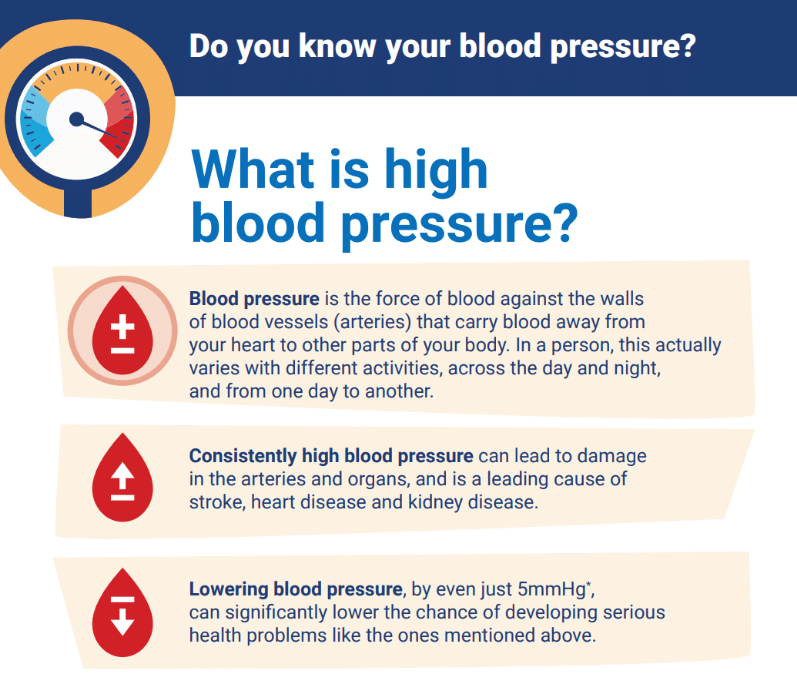
"Hypertension" Is High Blood Pressure
The reasons for developing high blood pressure are complex and can include lifestyle (e.g. diet and physical activity), genetic factors, and other medical conditions.
It is IMPORTANT you follow your doctor’s advice. If you are prescribed a medicine to help treat your high blood pressure, it will not cure it, but it will help control your blood pressure. So it is important to take it every day as advised.
Learn More About Blood Pressure
Monitoring Your Blood Pressure at Home
Find out more about ambulatory blood pressure monitoring
Find out more about
home blood pressure monitoring
Pressure Wise - Recorded Webinar
In this webinar, leading experts from Hypertension Australia and the Heart Foundation provide an overview of what the dangers of hypertension and what we can do to change our risk of cardiovascular disease.
MAKE A DONATION
Heart health, blood pressure and lifestyle choices
There are many things you can do to help your heart health. These include what you eat and drink, how physically active you are, how stressed you are, whether you smoke, and how well you sleep. For more information on a heart healthy diet, recipes and food labels click on the button below.
For specific lifestyle advice to promote your heart health, make an appointment with your GP.
Heart health, blood pressure and lifestyle choices
There are many things you can do to help your heart health. These include what you eat and drink, how physically active you are, how stressed you are, whether you smoke, and how well you sleep. For more information on a heart healthy diet, recipes and food labels click on the button below.
For specific lifestyle advice to promote your heart health, make an appointment with your GP.
NUMBERS THAT MATTER, MEASURABLE RESULTS
fundraising & donation campains
of clients have increased coping skills
of clients saw an income
increased community needs
Frequently Asked Questions
Blood pressure is needed to keep blood flowing around the body. Blood pressure is usually measured in the upper arm artery and expressed in units called millimetres of mercury (mmHg). It varies with each heartbeat, from a high point (systolic) to a low point (diastolic). High blood pressure (also known as ‘hypertension’) can be defined as more than 140/90 mmHg in adults.
Blood pressure is high even if only one of the numbers is above the threshold (for example, 144/80 mmHg or 136/96 mmHg).
If blood pressure is high it can damage arteries and the organs (heart, kidney, and brain) that these blood vessels supply. High blood pressure is a major risk factor for stroke and heart attack.
For most people there is not a single cause of high blood pressure. Some things that increase the chance of someone having high blood pressure include smoking, dietary factors (such as too much salt and sugar, not enough fibre and plant-based foods), being overweight, insufficient physical
activity, and sleep problems (such as obstructive sleep apnoea). A family history of high blood pressure (genetics) can also contribute. Some people develop high blood pressure because they have disease of the kidney, adrenal glands or pituitary gland.
High blood pressure usually causes no symptoms, in which case the only way you can know if your blood pressure is high is to measure it. If symptoms do occur, they usually take the form of headaches or a full or fuzzy feeling in the head.
- Get regular exercise. If you’re aged 65 years or older, try to do 30 minutes of moderate exercise 5 days a week (walking is fine). This can be taken in 10 minute bouts if you can’t get 30 minutes at one time. If you’re under 65 years old, try to be active on most days and get 2.5 to 5 hours of physical activity per week, including 75 to 150 minutes of vigorous exercise.
- Don’t smoke. For resources and support in quitting: https://www.quit.org.au/ or talk to your GP.
- If you are overweight try to reach your goal weight or at least aim for a 5 kg reduction. It is even more important for you to lose weight from around the tummy. Women aim for an 80 cm waist, men a 90 cm waist.
- If you drink alcohol, do so in moderation: 2 standard drinks per day (or less) with 2 alcohol free days a week (or more).
- Eat plenty of fresh fruit and vegetables.
- Don’t add salt to your cooking or meal. Choose low salt manufactured products from the grocery store. Look at the nutrition panel on the side of the packet and aim for ‘Sodium content’ of 120 mg per 100 gm or 100 ml or less.
Your blood pressure is one component of your risk for heart attacks and strokes. See your GP for an assessment for your need for medication. Once medication is started it is usually life long unless you make big changes in your lifestyle.

